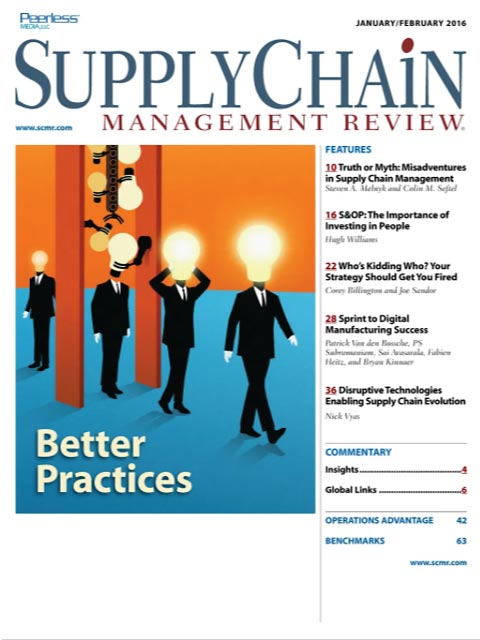Sorry, but your login has failed. Please recheck your login information and resubmit. If your subscription has expired, renew here.
January-February 2016
It’s a new year. Most of us will have new budgets to meet and new expectations for the performance of our supply chains. Many will look to best practices from industry leaders to improve our operations. But, are best practices really the “best” way to go? As you think about 2016, I hope you ask the question: What better practices can I adopt for my supply chain? Browse this issue archive.Need Help? Contact customer service 847-559-7581 More options
Lost in some of the more passionate, and often inflamed, dialogue on global immigration is the argument that immigration can result in positive long-term outcomes for supply chains both here and in the EU.
If strong supply chains translate into stronger national security—as we believe they do—then it’s time to step up and champion policies that ensure Western World nations continue to welcome highly-motivated émigrés to their shores. Two recent studies make compelling cases in support of this position.
The McKinsey Global Institute—the business and economics research arm of McKinsey & Company—posits in its paper “A Window of Opportunity for Europe,” that the EU has a solid platform for renewal, based largely on its ability to absorb a new generation of young workers. Here in the U.S., a Brookings Institution paper, “The Rise of New Immigrant Gateways,” examines trends in immigrant population growth through an updated metropolitan immigration typology, with special attention to the working age population, and the impact of immigrants on population change in metropolitan America.
 |
This complete article is available to subscribers
only. Click on Log In Now at the top of this article for full access. Or, Start your PLUS+ subscription for instant access. |
SC
MR
Sorry, but your login has failed. Please recheck your login information and resubmit. If your subscription has expired, renew here.
January-February 2016
It’s a new year. Most of us will have new budgets to meet and new expectations for the performance of our supply chains. Many will look to best practices from industry leaders to improve our operations. But, are… Browse this issue archive. Access your online digital edition. |
Download Article PDF |
Lost in some of the more passionate, and often inflamed, dialogue on global immigration is the argument that immigration can result in positive long-term outcomes for supply chains both here and in the EU.
If strong supply chains translate into stronger national security—as we believe they do—then it's time to step up and champion policies that ensure Western World nations continue to welcome highly-motivated émigrés to their shores. Two recent studies make compelling cases in support of this position.
The McKinsey Global Institute—the business and economics research arm of McKinsey & Company—posits in its paper “A Window of Opportunity for Europe,” that the EU has a solid platform for renewal, based largely on its ability to absorb a new generation of young workers. Here in the U.S., a Brookings Institution paper, “The Rise of New Immigrant Gateways,” examines trends in immigrant population growth through an updated metropolitan immigration typology, with special attention to the working age population, and the impact of immigrants on population change in metropolitan America.
 |
SUBSCRIBERS: Click here to download PDF of the full article. |
SC
MR

Latest Supply Chain News
- How CPG brands can deliver on supplier diversity promises
- How S&OP provides the answer to in-demand products
- AI, virtual reality is bringing experiential learning into the modern age
- Humanoid robots’ place in an intralogistics smart robot strategy
- Tips for CIOs to overcome technology talent acquisition troubles
- More News
Latest Podcast

 Explore
Explore
Topics
Latest Supply Chain News
- How CPG brands can deliver on supplier diversity promises
- How S&OP provides the answer to in-demand products
- AI, virtual reality is bringing experiential learning into the modern age
- Humanoid robots’ place in an intralogistics smart robot strategy
- Tips for CIOs to overcome technology talent acquisition troubles
- There is still work to do to achieve supply chain stability
- More latest news
Latest Resources

Subscribe

Supply Chain Management Review delivers the best industry content.

Editors’ Picks






